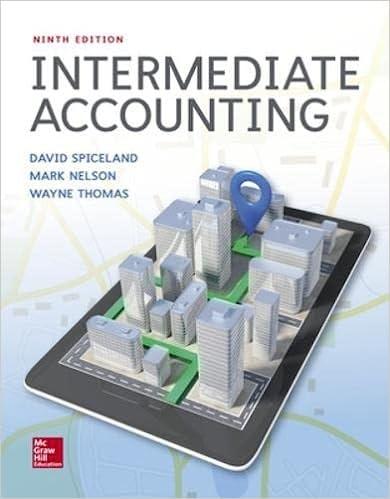The unadjusted trial balance of the Manufacturing Equitable at December 31, 2018, the end of its fiscal
Question:
Accounts receivable ..............................$ 92,500
Accounts payable ....................................35,000
Bank notes payable ................................600,000
Mortgage note payable.......................... 1,200,000
Other information:
a. The bank notes, issued August 1, 2018, are due on July 31, 2019, and pay interest at a rate of 10%, payable at maturity.
b. The mortgage note is due on March 1, 2019. Interest at 9% has been paid up to December 31 (assume 9% is a realistic rate). Manufacturing intended at December 31, 2018, to refinance the note on its due date with a new 10-year mortgage note. In fact, on March 1, Manufacturing paid $250,000 in cash on the principal balance and refinanced the remaining $950,000.
c. Included in the accounts receivable balance at December 31, 2018, were two subsidiary accounts that had been overpaid and had credit balances totaling $18,000. The accounts were of two major customers who were expected to order more merchandise from Manufacturing and apply the overpayments to those future purchases.
d. On November 1, 2018, Manufacturing rented a portion of its factory to a tenant for $30,000 per year, payable in advance. The payment for the 12 months ended October 31, 2019, was received as required and was credited to rent revenue.
Required:
1. Prepare any necessary adjusting journal entries at December 31, 2018, pertaining to each item of other information (a-d).
2. Prepare the current and long-term liability sections of the December 31, 2018, balance sheet.
Financial Statements
Financial statements are the standardized formats to present the financial information related to a business or an organization for its users. Financial statements contain the historical information as well as current period’s financial... Accounts Receivable
Accounts receivables are debts owed to your company, usually from sales on credit. Accounts receivable is business asset, the sum of the money owed to you by customers who haven’t paid.The standard procedure in business-to-business sales is that...
Fantastic news! We've Found the answer you've been seeking!
Step by Step Answer:
Related Book For 

Intermediate Accounting
ISBN: 9781259722660
9th Edition
Authors: J. David Spiceland, James Sepe, Mark Nelson, Wayne Thomas
Question Posted:





